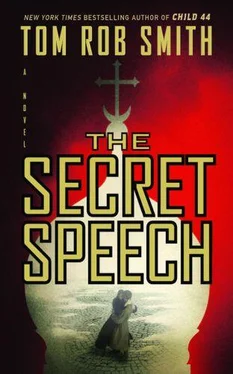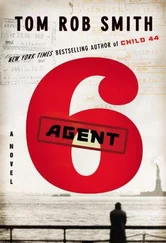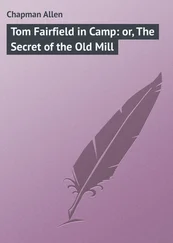Tom Smith - The Secret Speech
Здесь есть возможность читать онлайн «Tom Smith - The Secret Speech» весь текст электронной книги совершенно бесплатно (целиком полную версию без сокращений). В некоторых случаях можно слушать аудио, скачать через торрент в формате fb2 и присутствует краткое содержание. Жанр: Триллер, на английском языке. Описание произведения, (предисловие) а так же отзывы посетителей доступны на портале библиотеки ЛибКат.
- Название:The Secret Speech
- Автор:
- Жанр:
- Год:неизвестен
- ISBN:нет данных
- Рейтинг книги:5 / 5. Голосов: 1
-
Избранное:Добавить в избранное
- Отзывы:
-
Ваша оценка:
- 100
- 1
- 2
- 3
- 4
- 5
The Secret Speech: краткое содержание, описание и аннотация
Предлагаем к чтению аннотацию, описание, краткое содержание или предисловие (зависит от того, что написал сам автор книги «The Secret Speech»). Если вы не нашли необходимую информацию о книге — напишите в комментариях, мы постараемся отыскать её.
The Secret Speech — читать онлайн бесплатно полную книгу (весь текст) целиком
Ниже представлен текст книги, разбитый по страницам. Система сохранения места последней прочитанной страницы, позволяет с удобством читать онлайн бесплатно книгу «The Secret Speech», без необходимости каждый раз заново искать на чём Вы остановились. Поставьте закладку, и сможете в любой момент перейти на страницу, на которой закончили чтение.
Интервал:
Закладка:
— What happened?
Raisa squeezed his hand. He answered:
— They took Elena.
Neither Stepan nor Anna said a word. Stepan helped Raisa to her feet, wrapping a towel around her, guiding her to the kitchen. Anna took Leo into the bedroom, examining the cut. She dressed the wound, behaving as she had done when he’d been a boy and had hurt himself. Finished, she sat beside Leo. He kissed her on the cheek, stood up, walked into the kitchen, stretching out his hand to Raisa:
— I need your help.
FROL PANIN WAS LEO’S MOST INFLUENTIAL ALLY, but he was unavailable, out of the city. Although they weren’t friends, three years ago Major Grachev had supported Leo’s proposal to create an autonomous homicide department. Leo had reported to him directly for the first two years until Grachev had stepped aside, making way for Panin. Since then Leo had seen the major infrequently. However, a proponent of change, Grachev believed that the only way to govern was by making amends, seeking to admit and readdress, in moderation, the wrongs perpetrated by the State.
With Raisa by his side, Leo knocked on Grachev’s apartment door, instinctively checking the length of the communal corridor. It was late but they couldn’t wait until morning, fearful that if their efforts lost momentum a sense of crushing despondency would return. The door opened. Accustomed to seeing the major in a pristine uniform, it was a shock to see him scruffily dressed, his glasses smudged with finger-prints, his hair wild. Normally formal and restrained, he embraced Leo affectionately, as though reunited with a lost brother. He bowed affectionately before Raisa:
— Come in!
Inside there were boxes on the floor, items being packed. Leo asked:
— You’re moving?
Grachev shook his head:
— No. I’m being moved. Out of the city, far away, I couldn’t even tell you where, really I couldn’t. They did tell me. But I’d never heard of the place. Somewhere north, I think, north and cold and dark, just to make the point even clearer.
His sentences were tumbling one after the other. Leo tried to focus him:
— What point is that?
— That I am no longer a man in favor, no longer the man for the job, any job it seems, other than running a small office in a small town. You remember this punishment, Leo? Raisa? Exile. You both suffered it yourself.
Raisa asked:
— Where is your wife?
— She left me.
Preempting their condolences, Grachev added:
— By mutual agreement. We have a son. He has ambitions. My relocation would ruin his chances. We have to be practical.
Grachev stuffed his hands into his pockets:
— If you came for my help, I am afraid my situation has deteriorated.
Raisa glanced at Leo, her eyes asking whether it was worth explaining their predicament. Grachev spotted her reaction:
— Talk to me, if not because I can help, then as conversation between like-minded friends.
Embarrassed, Raisa blushed:
— I am sorry.
— Think nothing of it.
She quickly explained:
— Elena, our adopted daughter, has been taken from us and admitted to a psychiatric hospital in Kazan. She never recovered from the murder of her sister. I had arranged for her to see a doctor on an unofficial basis.
Grachev shook his head, interjecting:
— Nothing is unofficial.
Raisa tensed:
— The doctor promised not to make any records of her treatment. I believed him. When she didn’t respond to his treatment…
— He committed her in order to protect himself?
Raisa nodded. Grachev considered, before adding, as an afterthought:
— I fear none of us will recover from Zoya’s murder.
Surprised by this comment, Leo sought an explanation:
— None of us? I don’t understand.
— Forgive me. It is unfair to compare the wider consequences to the grief you must feel.
— What wider consequences?
— We needn’t go into that now. You’re here to help Elena—
Leo interrupted:
— No, tell me, what wider consequences?
The major perched atop a box. He looked at Raisa, then Leo:
— Zoya’s death changed everything.
Leo stared at him blankly. Grachev continued:
— The murder of a young girl to punish a former State Security officer, along with some fifteen or more retired officers hunted down and executed, several tortured. These events shook the authorities. They’d released this vory woman from the Gulags. What was her name?
Leo and Raisa replied at the same time:
— Fraera.
— Who else might they have released? Many hundreds of thousands of prisoners are coming home; how will we govern if even a fraction of their number behave like her? Will her revenge start a chain reaction culminating in the collapse of rule and order? There will be civil war once more. Our country will be ripped down the middle. This is the new fear. Steps have been taken to prevent this from happening.
— What steps?
— An air of permissiveness has crept into our society. Did you know there are authors writing satirical prose? Dudintsev has written a novel— Not by Bread Alone. The State and officials are openly mocked, in print. What follows next? We allow people to criticize. We allow people to oppose our rule. We allow people to take revenge. Authority that once was strong suddenly seems fragile.
— Have there been similar reprisals across the country?
— When I spoke about wider consequences I wasn’t merely referring to incidents within our country. There are reprisals across all the territories under our rule. Look at what happened in Poland. Riots were precipitated by Khrushchev’s speech. Anti-Soviet sentiment is stirring throughout Eastern Europe, Hungary, Czechoslovakia, Yugoslavia…
Leo was shocked:
— The speech has traveled?
— The Americans have it. They have printed it in their newspapers. It has become a weapon against us. It is perceived that we have dealt ourselves a terrible blow. How are we to continue the global revolution when we confess to such murderous acts against our own people? Who would want to join our cause? Who would want to become our comrades?
The major paused, wiping the sweat from his brow. Leo and Raisa were now crouching before him, like children captivated by a story. He continued:
— After Zoya’s murder everyone who argued for reform, including myself, was silenced. Even Khrushchev was forced to retract many of the criticisms he made in his speech.
— I didn’t know that.
— You were grieving, Leo. You buried your daughter. You buried your friend. You were not paying attention to the world around you. While you mourned, a revised speech was written.
— Revised how?
— The admissions of summary executions and torture were cut. This document was published one month after Zoya’s murder. I’m not claiming Fraera’s revenge was the only contributing factor. But those murders were important. They made a graphic case for the traditionalists. Khrushchev had no choice: a Central Committee resolution rewrote his speech. Stalin was no longer a murderer: he merely made errors. The system wasn’t at fault. Any minor mistakes were Stalin’s alone. It was the Secret Speech, without the secrets.
His mind turning these facts over, Leo remarked:
— My department’s failure to stop these murders was the reason they closed us down.
Читать дальшеИнтервал:
Закладка:
Похожие книги на «The Secret Speech»
Представляем Вашему вниманию похожие книги на «The Secret Speech» списком для выбора. Мы отобрали схожую по названию и смыслу литературу в надежде предоставить читателям больше вариантов отыскать новые, интересные, ещё непрочитанные произведения.
Обсуждение, отзывы о книге «The Secret Speech» и просто собственные мнения читателей. Оставьте ваши комментарии, напишите, что Вы думаете о произведении, его смысле или главных героях. Укажите что конкретно понравилось, а что нет, и почему Вы так считаете.












